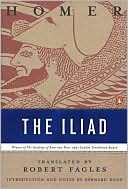 Whoo-Whee! I have something new and definitely very, very different to share with all of my readers. As all of you know, I am still working my way through many of the classics of ancient Greece. The more I have read, the more I have discovered and realized that these ancient poems and plays are truly the foundation and building blocks of much of the great works of literature that we all read today.
Whoo-Whee! I have something new and definitely very, very different to share with all of my readers. As all of you know, I am still working my way through many of the classics of ancient Greece. The more I have read, the more I have discovered and realized that these ancient poems and plays are truly the foundation and building blocks of much of the great works of literature that we all read today.These are some of the oldest recorded works in what we call the western canon, and the connections, themes, and ideas from these early works are clearly evident in subsequent literary works from antiquity all the way to the present. Authors and poets, over the centuries, have reached back to these classics as they tell their own tales. It never fails but to amaze me when I find these connections in whatever novel or poem I happen to be reading, or as I'm reading one of the Greek tragedies, I realize that I've seen the plot spun out as a poem by Keats, or a satirical novella by Margaret Atwood.
Well, what I have for you now is a bit of an epic modern poem that bridges the span of nearly 2,500 years back to Homer's The Iliad. Since 1959, a British poet, Christopher Logue has been slowly but steadily working on his own interpretation of The Iliad. He has carefully studied most, if not all, of the English-language translations, and has crafted his version, and published it in bits and pieces over the past nearly fifty years. Of the 24 books in The Iliad, I think he has retold about a dozen so far. I don't know if he plans to retell each and every book, but I believe he does intend upon publishing a combined, or unified, interpretation of his vision of The Iliad for our time.
I have three of Logue's books of poetry retelling portions of The Iliad, including the following:
War Music--An Account of Books 1-4 and 16-19 of Homer's Iliad (University of Chicago Press, 1997);All I can tell you is that this is some of the most visceral and shockingly intense poetry that I've read in a long, long time. It is poetry that is elegant, beautiful, biting, emotionally gut-wrenching, painful, humorous, lyrical, cinematic, and extraordinarily powerful. It screams to be read aloud, and it screams to be shared with everybody. On my train home from work tonight, I had an uncontrollable urge to stand up in the car and just begin reading out loud--I didn't, but maybe I should have.
All Day Permanent Red--The First Battle Scenes of Homer's Iliad (Farrar, Straus and Giroux, 2003); and
Cold Calls--War Music Continued (Faber & Faber, 2005).
I'm going to dip into Logue's second book, All Day Permanent Red--The First Battle Scenes of Homer's Iliad for the bit of his work I'm sharing here. The material covered by Logue in this volume is that generally contained in Books 4 and 5 of The Iliad. What a great title too--"All Day Permanent Red"--to describe the vicious and desperate hand-to-hand combat between the Achaean and Trojan warriors; but Logue apparently took the title for this slim volume from an old Revlon lipstick advertisement! It reminds me very much of the statement a veteran of the American Civil War made as he recalled the combat at the Battle of Antietam (September 17, 1862), "...that for a moment in his mind's eye the landscape around him turned red."
Without further ado, here is an excerpt from this brilliant poem--
All Day Permanent Red--The First Battle Scenes from Homer's Iliad
"Headlock. Body slam. Hands that do not reach back. Low dust.
Stormed by Chylabborak, driven in by Abassee
The light above his circle hatched with spears
Odysseus to Sheepgrove:
'Get lord Idomeneo from the ridge.'
Then prays:
'Brainchild Athena, Holy Girl,
As one you made
As calm and cool as water in a well.
I know that you have cares enough
Other than those of me and mine.
Yet, Daughter of God, without your help
We cannot last.'
Setting down her topaz saucer heaped with nectarine jelly
Emptying her blood-red mouth set in her ice-white face
Teenaged Athena jumped up and shrieked:
'Kill! Kill for me!
Better to die than to live without killing!'
Who says prayer does no good?
Seeing Athena's cry raise fight and fire in lord Odysseus,
Hera, Heaven's creamy Queen, told Diomed
(Still near the strip, content amid the crackle of snapped spears):
'Odysseus needs you. Go.'
Beneath a rise
300 paces downslope from
Chylabborak and Abassee
A party of 500 wandering Greeks
See Hector parked and praying:
'Lord of Light...'
While Lutie fills a bucket from the well
Where the Skean road that runs from Troy
Straight up the slope to the ridge
Crosses the track.
'...I shall be busy until dark.
If I forget you, do not you, me.'
Out from the wanderers the Teucer boys
Iolo, 16, from a wife, and Parthenos
Bred from a she Teucer inherited
Come crouch-down hurrying convinced that this
Their chance for fame Prince Hector dead etc. has come.
Parthenos set to plant his spear by Hector's spine,
Iolo, well...
Boy Lutie is astonished by their impudence
But not enough to not, in one,
Put down the bucket thrash his whip, its crack
Recalling Hector to his fate, its tip--as Parthenos
Jumped for the chariot's tailgate
And Hector's mittened hand snaffled his wispy beard--
Circling Iolo's wrist.
Parthenos kisses Hector's wrist.
His eyes are full of words.
'Take a deep breath before you speak, Greek boy.'
He does.
'Please, Prince of the Gate, take us alive.
We did not want to come to Troy.
We could not disobey our father's words.
His mother was your aunt Hesione.
He has a wall of swords--'
'With silver hilts,' Iolo says--
'And gold--a chest of gold.
Please. Please. Please. Please.'
The wanderers edge in.
Hector steps down.
The Teucer boys may not have been the brightest on the slope
But they are bright enough to know death when they see it.
'Keep your lives,' he said. 'A gift from Troy.'
And as they ran, made
'Go' to Lutie with his head,
Studied the wanderers,
Lifted the bucket, doused himself
And charged.
See an East African lionDespite the few who ran
Nose tip to tail tuft ten, eleven feet
Slouching towards you
Swaying its head from side to side
Doubling its pace, its gold-black mane
That stretches down its belly to its groin
Catching the sunlight as it hits
Twice its own length a beat, then leaps
Great forepaws high great claws disclosed
The scarlet insides of its mouth
Parting a roar as loud as sail-sized flames
And lands, slam-scattering the herd.
'That is how Hector came on us.'
Out from the rest to get at him and died
Or ducked and dodged his restless spear
And came away covered with blood and died,
Like shoppers trapped by a calamity
The rest pressed back onto the rest.
And he, partly to please his comet's tail,
Took sideways jumps--one foot up to the other in the air--
Chattering his spear along their front.
The ridge.
Sheepgrove (as asked).
Idomeneo does not wait.
Dustlight. Far off
A woman with an infant on her back
Is picking fruit."
(Pages 16-21)
***
Holy Cow! Can you believe this stuff? Every time I read these lines I am simply gobsmacked, and I need to reach down and pick my jaw up off of the floor. Logue forces you to recall your mythology--Zeus' "brainchild," Athena--the petulant, teenaged, ice-white faced Athena. This is great stuff! The description of Hector charging into battle was awesome and flat-out terrifying--the simile simply could not be better--equating Hector to a ferocious male African lion! And the perspective of young Lutie, Hector's nephew and chariot driver, sort of overlays the entire scene. The ending of this section of the poem is such a juxtaposition too, an almost jarring contrast from the shocking combat to this pastoral moment of a woman off in the distance up on the side-slope of the hill with her child on her back quietly picking fruit. In other words, even in the midst of all of this drama and pathos, life goes on. Trust me, all three of these books of poetry are like this. Your eyes are wide, wide open as you read each page, your brain is a sponge just taking in Logue's metaphors, his use of simile and allegory, and his just plain masterful use of language in turning phrase after phrase.
I also think it is important for me to add that I want you to know that I don't think that this is Homer modernized. No, this is a version--an interpretation--of Homer squarely landed in the oral tradition from whence it came, and somehow I think that Homer, and all of those who've translated The Iliad over centuries, would thoroughly approve of what Christopher Logue has done (and is continuing to do) and embrace his work wholeheartedly.
I plan to share more from Christopher Logue's volumes of interpretations of the books of The Iliad in the coming days, and I also plan to compare and contrast his poetry with my upcoming evaluation of Stephen Mitchell's new translation of The Iliad that is being released on October 12, 2011 (see my posting here). Stay tuned!














